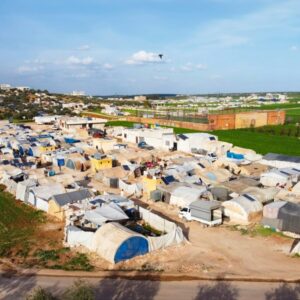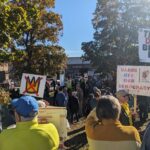
We are one of the only federal agencies that is charged and, in fact, required by Congress to investigate and prosecute discrimination across the country. Our investigators wear badges; they are law enforcement agencies. That is what Congress has charged them with. And that is the oath that we took when we decided to take these positions. And the frank fact of the matter is that right now discrimination is not being prosecuted. Fair housing laws are not being enforced. And what that means is that every American is less able to secure safe and stable housing.
Palmer Heenan, interview, Real News Network, Sept. 22, 2025
At NPQ, we have covered the mass layoffs of federal workers carried out by the administration of President Donald Trump, as well as federal worker organizing against those cuts. But the cuts’ impact has been harder to show. It is, after all, harder to illustrate the effect of nonactions than actions.
But a whistleblower report by four staff attorneys—Paul Osadebe, Palmer Heenan, and two anonymous complainants—at the Office of Fair Housing, a unit of the US Department of Housing and Urban Development (HUD), highlights the real-world effects of these nonactions.
At least 115 federal fair housing cases have been halted or closed entirely since Trump took office.
The staff attorneys first wrote their whistleblower report in the form of a confidential letter to US Senator Elizabeth Warren (D-MA) on August 27. (Warren is the ranking Democratic Party member on the US Senate Committee on Banking, Housing, and Urban Affairs.) They chose to make their letter public on September 22. One week later, on September 29, both Osadebe and Heenan were dismissed from their jobs; they have both indicated their intent to pursue protections as whistleblowers.
Understanding the Federal Fair Housing Office’s Role
The Office of Fair Housing and Equal Opportunity was created as part of the Fair Housing Act of 1968, legislation passed by Congress days after the assassination of Dr. Martin Luther King, Jr. As noted by Heenan above, the office is charged with enforcing fair housing law. And, each year, there are a lot of fair housing complaints.
The HUD attorneys’ whistleblower report offers a stark illustration of the degree of the rollback in fair housing enforcement.
In 2023, there were 34,150 formal federal complaints filed. The National Fair Housing Alliance wrote in its 2024 report that “fair housing is technically the law of the land but the everyday reality for many is quite different. There are tens of thousands of fair housing complaints filed each year, in addition to millions of unreported housing discrimination incidents nationwide.”
Signs of a rollback in enforcement of fair housing laws were apparent early on. Shelterforce and ProPublica reported in May 2025 that “at least 115 federal fair housing cases have been halted or closed entirely since Trump took office, with hundreds more cases in jeopardy” and noted that staff had already been cut by one-third since the start of the year.
What the Whistleblower Report Says
The HUD attorneys’ whistleblower report offers a stark illustration of the degree of the rollback in fair housing enforcement. Among the notable statistics:
- Estimated staff reduction of 65 percent (from 31 to 11)
- Reduction in Fair Housing staff attorneys from 22 to 6
- Decrease in charges of discrimination issued, from a historical annual average of 35 to 4
The whistleblower complaint also detailed a “a strict gag order that limits the ability of civil rights work to proceed. This order forbids OFH [Office of Fair Housing] attorney communication with external parties, including DOJ [Department of Justice] and other governmental agencies, and the parties in civil rights complaints, without express approval from political leadership.”
There are also other aspects of the Fair Housing Office’s work that are being impeded. For instance, the Office of Fair Housing has been tasked with implementing a section of the Violence Against Women Act that sought to ensure that victims of domestic violence can get safe housing.
This, Osadebe explained to NPQ, is “the law that moves people to safe housing when they are being stalked or being assaulted by their partner of someone is abusing their kids and need to get out of there or get off the street.”
Osadebe related that he was on the team assigned to the implementation of the Violence Against Women Act, and noted that the Trump administration “wanted to reassign almost that entire team away from that work.”
“We are the only ones who have the authority to enforce that law. So, if we can’t do it, it just won’t be enforced,” he emphasized. “By destroying that team and they destroyed the investigative team that investigates those cases as well…[the] law is just not going to be enforced going forward, which means people are in physical danger.”
Osadebe also commented on the broader impact of the rollback in enforcement of fair housing law: “It’s gotten to the point where…people are being recommended to just drop their cases by investigators at HUD, by outside counsel, by HUD itself now. They are subtly implying, ‘Hey. We have added a whole bunch of roadblocks. So, are you sure you want to go ahead? Are you sure you want to keep your claim with us? Don’t you just want to withdraw this?’”
What Comes Next?
At a personal level, Osadebe had been employed at HUD since March 2021; this means he has civil service rights and while removed from his position remains on paid administrative leave. Heenan was hired in October 2023 and was still on probationary status and was therefore immediately fired. Both are members of the American Federation of Government Employees (AFGE) Local 476 and are considering their legal options.
“Telling stories is really important…it is hard for me to do that as a federal worker and a lawyer, but [nonprofits] can do that in detail.”
At a political level, the struggle continues. The Federal Unionists Network, in a statement, has offered a list of demands, including rehiring staff, ending gag rules, and restoring domestic violence protections; it has also called for congressional hearings and for frozen grants to fair housing nonprofits to be restored. The National Low Income Housing Coalition has joined the call for hearings.
Osadebe added that nonprofits have an important role to play in making fair housing enforcement a reality. He called on local nonprofits to gather stories “to tell these members of the specific cases that are being dropped, the specific damage that is being done to people.”
“Telling stories is really important,” Osadebe said, “and it is hard for me to do that as a federal worker and a lawyer, but they can do that in detail and really bring it home for people. They can write op-eds in local papers. They can have rallies and pickets and collective office visits, collective calling of members of Congress. There are many, many things that we can all do [beyond] the courts.”
Osadebe added that “it is also important for nonprofits to know that the federal workers in the building are eager to partner. The unions are eager to partner.” He conceded that the “relationship has not always been there. I don’t think either partner knows that that is even an option. But it is and it is necessary right now.”
Federal workers, Osadebe noted, “are the ones in the building who know what’s happening. It shouldn’t be a situation where nonprofits are only finding out from the news….We are here to keep lines of communication open and to organize together to stop the attacks.”














